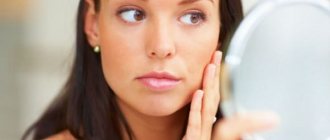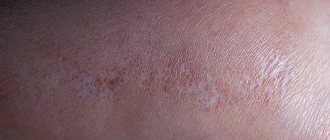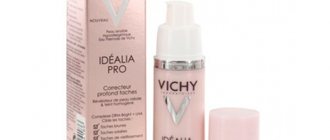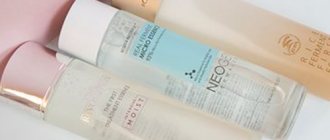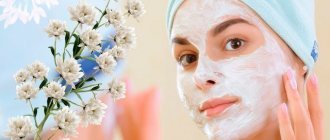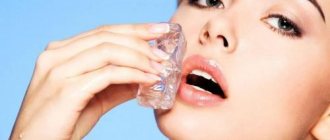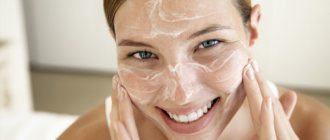Problematic facial skin: features
Problematic facial skin is a collective definition that applies to skin prone to excessive dryness or, conversely, greasiness, the formation of pimples, blackheads, blackheads, pigment spots, and vascular defects.
It can be recognized by the following signs:
- areas of redness, peeling;
- enlarged pores;
- greasy shine;
- spider veins;
- unhealthy color;
- dark spots;
- lumpy surface;
- boils;
- pimples, acne;
- itching
Problematic skin ages faster because it often succumbs to inflammation, metabolic processes and blood circulation are disrupted. Because of this, wrinkles may already appear at an early age.
Impaired production of sebum leads to the proliferation of fungal microorganisms and bacteria, which can result in more serious dermatological problems.
Dermatologist Deborah Longwill
Signs
Skin problems on the face are dry flaky areas, oily forehead, sagging, double chin. In adolescents, hormonal changes in the body stimulate increased sebum production. This is manifested by acne, acne, and too porous dermis. Other signs of skin defects:
- black dots;
- furunculosis;
- enlarged pores;
- acne;
- greasy shine;
- dark spots;
- excessive pallor or jaundice;
- fungal infections.
Types of problem skin
There are 3 types of such skin:
| Skin type | Peculiarities |
| Dry | The skin lacks sebum, which is necessary to protect against negative external factors. Therefore, it is susceptible to adverse weather conditions, mechanical stress, and poor-quality water. This type is characterized by dryness, flaking, a feeling of tightness, lack of oily sheen, frequent irritation, rash, and redness. The skin ages quickly, wrinkles appear prematurely, and the capillary network is visible. Due to a deficiency of sebum, infectious and allergic dermatological diseases are likely. The dermis needs regular nourishment and hydration, and is sensitive to certain components in cosmetics. |
| Fatty | This type is more common at a young age. The dermis is characterized by increased production of sebum (sebum). As a result, oily shine, enlarged pores, blackheads, and white pimples appear. Oily skin is not prone to premature aging, but it has other disadvantages - acne, acne, oily seborrhea. Due to poor blood circulation, the face acquires a yellowish, olive tint. |
| Combined | Combines the best of both oily and dry skin. Caring for it is the most problematic. The skin on the forehead, nose and chin is oily, while the skin around the eyes and cheeks is dry. |
Care for young problem skin is selected taking into account the above types.
Pimples on the cheeks. Before and after
Solving your acne problem is often only half the battle.
This beauty fell into my hands after almost all the rashes had passed. There were small scars left, lucky that they were quite flat (level with the skin, the relief was practically unchanged) and already quite annoying stagnant spots. The request was to work specifically with skin tone, i.e. with bluish spots.
The result in the photo is not just one procedure; it seems to me that the difference between the photos is about a year. But the visits were not frequent, mostly once every 4 weeks. Some procedures were traumatic, others not so much.
The effect increased gradually, but my patient began to notice improvements almost immediately. I remember how they laughed, her mother did not believe that this was the work of a cosmetologist
“It can’t be, most likely you’ve started eating normally,” my mother said. But actually, this is even a compliment; modern methods can do a lot, despite the fact that they believe in diet more))
The spots are gone, the scars partially remain, but they are small and almost invisible. The skin tone is much more even, which is what we wanted. And most importantly, happy eyes
Cosmetologist's work:
- Permanent procedures
- Once every 4 weeks
- Increasing effect
- Even skin tone
Why do you have problem skin (8 reasons)
The reasons for this can be both external and internal. At a young age, up to about 20 years old, everything is attributed to hormonal changes, but at 30 years old, the causes of problematic facial skin can be associated with health problems.
Internal and external unfavorable factors affect the physiological and biochemical processes inside sebocytes (sebaceous cells).
As a result, their activity is disrupted, and at the same time the production of sebum is disrupted. With excess sebum production, a greasy film appears on the surface of the skin; with insufficient production, the protective properties of the dermis are reduced and color deteriorates.
Let's consider what factors can affect the functioning of the sebaceous glands.
Hormonal disorders
This is the most common culprit of problematic facial skin both at 30 and 50 years old, and during adolescence.
Hormonal changes affect the functioning of the omentums, causing them to work harder and release waste products onto the surface of the skin. Because of this, it becomes sticky and shiny.
Skin problems caused by hormone imbalances are more common during adolescence, menopause and premenstrual periods.
Dermatologist Sean Allen
Improper care
Dehydration of the dermis, lack of nutrition, the use of aggressive decorative cosmetics or inappropriate care products lead to skin problems.
You should select cosmetics without forgetting what type of skin you have, so that the activity of sebocytes will not be disrupted.
Nutrient deficiency
Lack of vitamins A, E, C leads to a decrease in sebum production. As a result, areas of peeling, microdamage to the skin, and bacterial infections appear.
Bad habits
Smoking and drinking alcoholic beverages cause metabolic disorders in the sebaceous glands, which is why sebum begins to accumulate, blackheads and an oily sheen appear.
Decreased local immunity
This problem can be caused by improper care, use of low-quality or inappropriate cosmetics, bad habits, nutritional deficiencies, and ultraviolet radiation.
Psychosomatics plays an important role in problem skin. Stress and neuroses lead not only to hormonal disorders, but also to a decrease in the protective properties of the skin.
Inadequate rest
Healthy sleep is important for normal regeneration processes, health and beauty of the skin. When you don't get enough sleep, your body becomes stressed and produces more sebum.
Despite this, the skin becomes flabby, acquires an unhealthy gray-green tint, dark circles and bags under the eyes appear.
Healthy sleep lasts at least 8 hours, you need to go to bed before 23:00.
Family physician Stephen Weinman
Gastrointestinal diseases, unhealthy diet
Poor digestion leads to food stagnation. Undigested food causes fermentation processes and turns into real poison.
Toxic substances are partially eliminated through the skin, which begins to become inflamed, pimples and comedones form. This is why there is an expression that bowel problems show up on the face.
Consumption of fatty, fried foods and fast food contributes to the production of sebum and the appearance of acne. That's why it's so important to eat a healthy diet.
Heredity
Rashes, like allergic skin diseases, can be inherited. Heredity can affect the state of hormonal levels, the appearance of endocrine diseases, the functioning of the sebaceous glands, and the composition of sebum.
How to adjust your diet
There are lists of foods that are recommended to be excluded from the diet. These are fatty meats and poultry, fried, smoked foods, artificial fats (products containing mayonnaise, vegetable oil, margarine), seasonings and flavor enhancers, sugar, flour, soda, fast food, alcohol, coffee and strong tea. A little more about the latter. The fact is that alcohol and drinks containing caffeine provoke the secretion of cortisol, which activates the sebaceous glands. Also, sometimes dairy products are included in the prohibited list, but this decision is made based on the individual characteristics of the body.
In addition, the skin loves water very much. The prescribed norm of eight glasses a day is no longer entirely relevant information, since the calculation should be based on the constitution of the body, the level of physical activity and lifestyle of a person, the time of year and a number of other factors. Of course, the more water you drink, the better, but you can calculate the required amount of liquid mathematically - 35 milliliters per kilogram of weight.
View on Instagram
How to determine the cause of skin problems
What causes inflammation, the appearance of pimples or blackheads depends on their location:
- Chin – hormonal disorders, diseases of the reproductive system.
- Cheeks – bad habits, unhealthy diet, abuse of sweet foods.
- Bridge of the nose – toxic substances accumulated in the body, liver disease.
- Forehead – gastrointestinal diseases, consumption of fatty, fried and spicy foods.
Hormonal acne and pimples form not only on the chin, but also on the jaw line, at the corners of the face in the area from the cheekbones to the temples. The peak of their appearance in girls occurs during PMS, at the age of 21-35 years.
Internal reasons
The main reason for excessive oiliness is poor nutrition. The process of activating the sebaceous glands is triggered by the following products:
- fat meat;
- smoked meats;
- chocolate and sugar;
- bakery;
- chips.
Another internal cause of inflammation of the skin is gastritis.
Unexpected “blooming” of the skin is a reason to visit a gastroenterologist. The specialist will prescribe an examination and select a diet.
Internal causes that contribute to the deterioration of skin condition also include hormonal changes. Inflammation before menstruation is natural, but due to polycystic ovary syndrome, it can develop into severe acne.
A visit to the gynecologist is another step on the path to a glowing health, not fat face.
Question answer
You should be careful when using scrubs.
If acne is in the acute phase, it is better to postpone their use. Otherwise, the inflammation may worsen. If the rashes have decreased, then you can use the scrub 2 times a week. Pay attention to those products that fight bacteria and normalize sebum production. Many people think that such skin does not need to be moisturized, but moisturizing with cream leads to the restoration of the hydrolipid mantle. Use products with a soft texture.
Foundations should protect the skin from UV rays, soothe it, and be light. Make sure they are suitable for problem skin.
Comprehensive care for problem skin at home
Avoid using harsh face washes
Do not use rough washcloths on your skin. Harsh materials will cause your skin to produce more oil. Either avoid using anything on your skin or use a soft cloth.
Adjust your facial cleansing routine
Your sebum production may change depending on the season. Your hormone levels may change and affect your oil production. When you notice that your face and body are more oily than usual, you may want to wash it with cleanser more often than when your skin doesn't produce much oil.
- You can incorporate toners or clay masks into your regimen when you have more oil. Apply the toner or mask only to oily areas of your face or body. These products can dry out your skin excessively.
- For example, your body may produce more sebum in the summer than in the winter. This means that you may need a different detergent or cleansing regimen during the summer than during the winter.
Change your diet.
Eating a healthy diet can help reduce sebum production naturally. Many vitamins and minerals can help reduce oil production, but they must be obtained from food sources to be beneficial. You can get the nutrients you need by eating fresh vegetables and fruits and significantly reducing the amount of processed food you eat.
- Wheat, dairy products and sugar can lead to excess sebum production. Try eliminating these things from your diet to see if they help reduce the amount of oil your body produces.
- Omega-3 fatty acids found in fish and monounsaturated fats found in nuts help maintain healthy skin.
- An unhealthy gut can lead to excess oil production. Probiotics help promote gut health. Try adding Greek yogurt, kefir, and sauerkraut to your diet.
Moisturize your face with argan oil
Argan oil can help with your skin's sebum production If you have oily skin, using argan oil on your skin can provide the moisture your skin needs which can help balance your skin's natural oil production. You can use argan oil directly on the skin or use products that contain it.
Talk to your doctor about taking vitamin A
Vitamin A may help with acne. However, there are some risks associated with taking high doses of vitamin A, so it is important to talk to your doctor before taking these supplements.
Treatment of problem skin
Treatment of problematic facial skin at home, namely pimples, blackheads and acne, should begin with finding the cause. For this, consulting a cosmetologist is not enough; you may need the help of other specialists - an endocrinologist, gynecologist, gastroenterologist, nutritionist.
The first thing you need to do is check your hormonal levels. If there are any deviations, undergo a course of hormonal therapy. The treatment will help get rid of hormonal acne and also stop hair loss.
For infectious and inflammatory processes, antibacterial agents are effective in combination with other external medications. But all medicinal ointments must be prescribed by a doctor.
Salicylic acid is suitable for oily and combination skin types. It has an anti-inflammatory effect and normalizes the functioning of the sebaceous glands.
If skin problems are caused by dysbiosis, then probiotics are prescribed; if exposed to an allergen, antihistamines are prescribed.
Along with medicinal cosmetics and medications, salon procedures are effective:
- Cryotherapy. Exposure of the dermis to cold helps narrow pores, reveal hidden potential, and activate the production of elastin and collagen.
- Ozone therapy. The use of ozone helps improve color, texture, and healthier dermis.
- Manual, ultrasonic or combined cleaning. Allows you to cleanse the skin. Ultrasonic is effective for superficial contamination, manual - for deep contamination.
- Mesotherapy. The nutritional mixture may contain vitamins, minerals, amino acids, and antioxidants. With its help, you can reduce inflammation, after it the color will become better, and rashes will disappear.
- Peeling. Allows you to get rid of scars, scars, age spots, and narrow enlarged pores.
When treating problem skin, pimples and blackheads should never be squeezed out on your own. The skin can be seriously injured, resulting in the appearance of a spider vein, and there is a risk of infection.
During treatment, you must adhere to a healthy diet. Avoid fatty, spicy, fried foods, sweets, fast food, processed foods, carbonated and alcoholic drinks. If you have a food allergy, exclude allergenic foods from your diet.
Dermatologist Sean Allen
What salon treatments are worth trying?
To treat problem skin, a comprehensive approach is required, which also includes salon procedures. What services can a cosmetologist recommend to you:
Ultraviolet irradiation. During the procedure, the skin is exposed to ultraviolet rays, which cause redness and peeling. But in this case, these consequences quickly pass and, on the contrary, have a positive effect - the number of comedones and blackheads is reduced.
View on Instagram
Peeling. Medium peels containing glycolic or AHA acids are well suited for problem skin. The cosmetologist advises how often to carry out the procedure and which drug is best to use, based on your characteristics.
Mesotherapy is a microinjection intradermal administration of medicinal substances directly to the site of inflammation. This technique allows you to use the drug in minimal doses and act directly on the problem area.
View on Instagram
Laser. One option is to use an infrared diode laser with beams with a depth of 1450 nanometers. It has a thermal effect on the sebaceous glands, which reduces the severity and amount of acne. Special pulsed dye lasers can also be used. Their distinctive feature is the very short duration of the pulses, between which there is a long interval. In addition to the therapeutic effect, they enhance collagen production and thereby reduce the risk of acne scars.
Proper care
When caring for problem skin, it is important to determine the type of skin. Depending on this, caring cosmetics are selected.
The owner of problematic skin should have the following products in her arsenal:
- Shower gel. It is advisable to choose a product that cleanses and tightens pores. It can be used 2 times a day.
- Scrub. It is best used by those with oily and combination skin. It can also be beneficial for dry skin, but you shouldn’t injure it again.
- Tonic or lotion. You need to choose a product with small particles, specifically for sensitive or problematic skin. It cleanses, tightens pores, reduces inflammation and eliminates oily shine without harming the dermis.
- Cream for moisturizing dry or oily skin. Such products restore the hydrolipid balance, promote cell regeneration and strengthen local immunity. They need to be applied with massage movements until completely absorbed.
- Nourishing, moisturizing, anti-inflammatory, masks for acne, blackheads. They are used once a week after thoroughly cleansing the skin. After the procedure, it is advisable to use a tonic or cream.
Cosmetics must be hypoallergenic and do not contain aggressive components, such as alcohol or alkalis.
Dermatologist Sean Allen
During care, it is important to consider not only skin type, but also seasonality. In summer, it is necessary to use sunscreen, especially for oily skin, since UV radiation stimulates sebum production.
In winter, it is important to protect your face from cold wind and frost. You need to use nourishing and moisturizing creams, use decorative cosmetics with a thick texture. This will help create an additional protective barrier.
Caring for problematic facial skin at home should be comprehensive. In addition to the correct selection of cosmetics, it is important to follow the following recommendations:
- Wash your face only with warm water; hot water stimulates sebum production. Cleanse your skin morning and evening, without using soap, only special washing gels.
- Eat properly. It is important to nourish the skin with nutrients not only from the outside, but also from the inside. You can take vitamin complexes for beautiful skin. Omega-3 polyunsaturated fatty acids, zinc, and vitamins B, A, E, and C are of great importance.
- Refuse to visit the bathhouse, sauna, solarium.
- Stay in the sun as little as possible; ultraviolet rays can lead to treatment failure.
Can mineral cosmetics clear up acne?
Mineral cosmetics are one of the most popular products on the market. Manufacturers advertise it as a more natural and gentle variety of makeup products that will not cause irritation for skin diseases such as eczema, rosacea, and acne.
But using mineral cosmetics alone is not enough to get rid of acne, especially since they are not intended for this purpose. But this does not mean that this type of cosmetic product does not have its advantages. In particular, its supporters claim that, unlike traditional cosmetics, there are no fragrances, preservatives, or other ingredients that can cause problems for people with sensitive skin.
In addition, almost any mineral cosmetics contains ingredients such as titanium dioxide and zinc oxide, which have anti-inflammatory properties; these substances also cope well with irritation and counteract the harmful effects of sunlight. It’s not for nothing that zinc oxide is the main active ingredient in baby balm for burns.
Some skin care experts claim that mineral makeup is nothing more than a beauty industry marketing gimmick. No real research confirms that this type of product has any effect on acne.
Most mineral cosmetics are non-comedogenic and do not tend to clog pores or worsen acne. However, some brands use bismuth oxychloride in their products, which can cause skin irritation. Therefore, do not forget to read the list of ingredients of the product you are purchasing. If your acne is somehow related to the cosmetics you already use (cosmetics that cause acne are called comedogenic), then switching to mineral products will bring you relief. But for the vast majority of people, such a step will not affect the condition of the rash in any way.
You like mineral cosmetics - use them for your pleasure, but don’t expect that they will have any significant effect on acne. For this purpose, it is better to use special medications.
Tags: acne
Market Analytics
- Black Lives Matter movement: reaction and consequences for the beauty industry
- COVID-19 is changing the rules of the game in the cosmetics market
- Beauty of the future: cosmetic innovations 2020
Convenient search for beauty salons on our website
Beauty salons in Moscow Beauty salons in St. Petersburg Beauty salons in Ekaterinburg Beauty salons in Novosibirsk
Latest blog posts on our website
- Naturecream / Apricot kernel oil for face
- Naturecream / MATRIXYL3000 - the best skin elasticity stimulator
- Naturecream / SPF in Natural Oils
- Naturecream / Geranium (Pelargonium) oil for skin health and beauty
- Prostye-sovety / Save on a beauty salon: procedures that can be done at home
- Naturecream / Growth Factor - brings back youth?
- Oksana-Lezina / 3 effective abdominal exercises from a fitness instructor for beginners
- Prostye-sovety / Making perfect curls at home
- Prostye-sovety / Which hair removal method to choose
- Naturecream / Wrinkles Puppets
Latest forum topics on our website
- Natalya / How to properly make a gelatin mask?
- Mrs._Smith / Badly sunburned! What to do?((
- Ice / Is it necessary to combine fitness classes with a diet?
- Antonova / What can be used for hair loss?
- Radio operatorKat / Who was on a protein diet?
Other articles in this section
| Makeup for acne: step-by-step video instructions and tips for choosing cosmetics Acne and pimples on the face are not a reason to give up makeup. And although there is nothing better than clear skin, there are times when you need to cover up acne with makeup. In addition, good makeup increases a person’s self-esteem and self-confidence. |
| Face masks for acne One of the signs of health is clean, well-groomed skin. The appearance of acne spoils its appearance and can also cause the development of certain diseases. Before you begin treating pimples and acne, it is important to determine the factor that caused them. This will allow you to effectively cope with the problem that has arisen and will prevent the emergence of new formations. |
| Using Benzyl Benzoate Cream for Acne Most people associate the medicine Benzyl Benzoate with eliminating parasites - lice, nits. It is not very common information that the use of this remedy is also effective in treating acne. A specific indication for the use of Benzyl Benzoate cream is pustular rashes, but not of hormonal origin, but caused by the harmful effects of parasites (such as subcutaneous mites, etc.) on tissue. |
| Application of Skinoren for acne The drug Skinoren is an anti-inflammatory drug intended exclusively for external use. Release form - gel and cream (ointment): they need to be applied to cleansed skin at regular intervals. The multiplicity is determined by a dermatologist after examining the site of inflammation. |
| Using the drug "Belara" for acne "Belara" is a hormonal-based contraceptive. It is often prescribed for the treatment of rashes on the face, which allows you to get two effects at once - protection from unwanted pregnancy and improvement of skin condition. Only a doctor can give such prescriptions - you need to contact a gynecologist and agree on how safe it is to take Belara in your case. |
| Acne on the back The appearance of acne on the back signals a more severe course of acne. In this article we will look at the features of the appearance and treatment of acne on the back, as well as the marks from them. |
| Could a new treatment make my acne worse? There is an opinion that acne may worsen after using a new medicine, and then improve. Is it really? |
| Acne - what tests to take, which doctor to see In this article we will look at what tests you need to take if you have acne, which doctor to see so that the correct treatment can be prescribed. |
| The use of the drug "Malavit" for the treatment of acne In dermato-cosmetology, various products are used - of natural or synthetic origin. The first group includes “Malavit”. This is a representative of the antibacterial group, providing a wide range of therapeutic effects. The main purpose of the drug is to treat the integument: mucous and skin. The remedy is produced in the form of a gel-cream and a solution: both forms are in demand. Its popularity is explained by its ability to eliminate itching, relieve pain and relieve swelling at the site of rashes. |
| Can food cause acne? Answers to questions about some foods Do milk, chocolate, sugar and other foods cause acne? Is it possible to avoid acne by eating only vegetarian food? The answers to these questions are in our article. |
Comments
- Maya | 2018-12-22 17:52:05 I took care of my acne-prone skin this way and that. Besides, it’s still dry, so it’s capricious. As a result, I came to the conclusion that you just need to cure acne, and then choose a treatment so that it does not appear. Based on my skin type, the dermatologist recommended me retinoic ointment, which is aimed specifically at eliminating the causes of acne. As a result of a month of treatment, my facial skin improved.
- Marinka |
2018-05-29 00:24:03 I also noticed that my skin became better after replacing liquid soap with gel propeller. And when I added Retasol on the advice of a dermatologist, I finally managed to get rid of acne.
Expert opinion
- Cosmetologist
- Surgeon
Anna Avaliani
practicing cosmetologist
If you have problem skin, pay special attention to cleansing. Choose suitable products and wash your face in the morning and evening. Acne often appears because the hydrolipidic layer is damaged. This happens due to aggressive care that dehydrates the skin. Do not use products that contain alcohol, do not wash with soap. Choose products with a pH of 5.0–5.5.
Sheila Nazaryan
plastic surgeon
For problem skin, products that contain acids are useful.
They mattify and relieve inflammation. Also those that contain zinc, which normalizes sebum production. Often, women with acne and oily skin often cleanse their skin, literally scrubbing it. But this disrupts the hydrolipid layer, which leads to an inflammatory process. Treating problematic facial skin at home can be effective if you listen to the advice of cosmetologists and nutritionists. Only with an integrated approach can you become the owner of a smooth, radiant and healthy dermis, without acne and other defects.
Can I use sunscreen on acne-prone skin?
Sunscreen should be applied every day, even if you have oily skin. After all, this is perhaps the only way to keep her healthy. This is especially important if you are using medications that cause sensitivity to sunlight!
However, forget about thick, smelly creams. Your choice is a product that does not contain oils and fats, light enough for quick absorption. Please ensure that the packaging states that the product is non-comedogenic. Moisturizers that contain sunscreen ingredients are suitable for you. Such cosmetics are very convenient to use: in one application you both replenish the water balance of the epidermis and protect the skin from ultraviolet radiation.
Give preference to products with SPF 15. Remember, the higher the SPF, the better protection it provides. In addition, make sure that the product protects against both UVA radiation and harmful rays from the sun.
Regular use of sunscreen cosmetics will not only protect your skin from sunburn, but also from hyperpigmentation, cancer and premature aging. Remember that the sun is skin's number one enemy.
By choosing an oil-free, non-comedogenic sunscreen, you won't have to worry about breakouts. It is recommended to try several products to find the perfect one for you. If you need help, contact a dermatologist or cosmetologist for a recommendation. Remember to use sunscreen daily.
Green tea for pimples and acne
Acne and blackheads, pimples on the forehead and nose... You don't have to be a teenager to face such problems. This deficiency is so common today that there is an entire industry that is constantly producing new creams and facial products that can correct these skin imperfections.
However, did you know that such a natural and affordable product as green tea will help you get rid of these unpleasant phenomena? In this article, we will describe three ways to use green tea that will make you forget about acne and blackheads on your face.
Mask based on green tea and white clay
Have you already heard about the incredible beneficial properties of white clay? White clay, or kaolin, is an excellent base for many natural skin care products. It cleanses and disinfects the skin well. That is why white clay should definitely be in your medicine cabinet if you want to forget about acne and blackheads.
- A mask based on white clay and green tea has excellent binding properties. Thanks to this, this product treats acne and blackheads while giving the skin a healthy and glowing appearance. Where can you buy white clay? Look for it in natural beauty stores and pharmacies. You will be pleasantly surprised that white clay is an affordable and inexpensive product. It is usually sold in powder form. You will immediately see that it is very easy to apply to the face as part of a natural mask.
- In order to make a mask based on white clay and green tea, first of all you need to prepare strong tea. Pour three green tea bags with half a glass of water. If possible, use water that does not contain chlorine.
- Once the tea is ready, add it to the clay. The mixture should be thick enough that you can easily apply it to your face. Mix the mask thoroughly and apply it to your face with massage movements, paying special attention to areas where there are blackheads or pimples.
- Leave the mask on for 15 minutes and then rinse it off with cool water. It is recommended to carry out this procedure twice a week.
Green tea and apple cider vinegar toner
We recommend washing your face with this product before going to bed three times a week. Apple cider vinegar and green tea together form a powerful combination that will ensure that acne and blackheads no longer ruin your appearance.
But why apple cider vinegar? Because this product is an excellent remedy for acne and blackheads, and it will also help balance the pH of your skin.
To prepare this natural tonic, you first need to brew green tea. Pour three green tea bags with half a glass of water and let it brew. Then add one teaspoon of apple cider vinegar to the mixture and pour the product into a spray bottle.
Place the product in the refrigerator for two days. After this, shake the bottle well and spray your face with toner. Wait at least 30 minutes, then thoroughly rinse your face and apply your usual moisturizing night cream. As you can see, everything is simple!
Steam bath with green tea
This method of using green tea against acne and blackheads is as simple as the previous ones.
It is effective enough to eliminate blackheads and help you forget about acne forever. You don't have to put in a lot of effort to prepare it. Here is the recipe:
- Boil some water in a saucepan and add 5 green tea bags. When the mixture has infused, lean over the pan, covering your head with a towel to prevent steam from leaking out. Remember to remove the vessel from the stove first and be sure to ensure that the steam does not scald your face.
- Do not lean too low over the pan to avoid burns.
- Allow the steam to seep into your skin. You will immediately understand how pleasant such sensations can be. In order to notice the effect of such a steam bath, it should be performed at least twice a week.
In addition, do not forget to consume green tea in the usual way: drink it in the afternoon. It will also help clear your skin of acne and blackheads.
Daily cleansing and care procedures can take several weeks, so be patient and persistent to get positive results.
Factors contributing to acne
Although the main causes of acne are usually hormonal or genetic, there are some additional factors that can worsen symptoms. For example:
- a diet rich in certain carbohydrates;
- excessive consumption of milk and other dairy products;
- smoking;
- Skin care products and makeup that block pores and cause comedones.
Although it is always appropriate to consult a dermatologist even for mild and early symptoms (to prevent the condition from worsening), there are certain rules that must be followed:
Touching pimples makes their condition worse. Consult a professional cosmetologist.
- Wash your face with warm water, not too hot and not too cold.
- Wear makeup that does not cause acne.
- Use skin care products that do not cause acne.
- Let your pimples heal naturally—touching and squeezing can make them worse.
